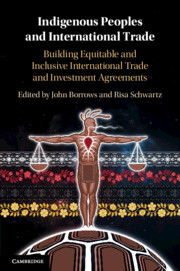 Indigenous Peoples and International Trade
Indigenous Peoples and International Trade from Part II - Building a More Equitable and Inclusive Free Trade Agreement
Published online by Cambridge University Press: 11 June 2020
Finally, in Chapter 12, Caroline Dommen concludes our discussion by addressing how human rights impact assessments can contribute to ensuring that Indigenous rights are upheld in international trade agreements. She considers how explicit reference to the rights of Indigenous peoples, including the UN Declaration on the Rights of Indigenous Peoples, may improve human rights impact assessments as well as trade agreements, from both legal and policy perspectives. There is now a substantial body of impact assessments of actual or likely impacts of trade and investment agreements on human rights, including on the rights of Indigenous peoples. Her chapter describes the role and the objectives of impact assessment, explaining the particular advantages of human rights-based impact assessment. It draws on recommendations of UN human rights mechanisms and analysis of completed impact assessments of trade agreements to present some of the main principles of human rights law that are relevant in the trade policy context, and how these impose legal obligations on states to carry out human rights impact assessments prior to adopting new trade agreements.
To save this book to your Kindle, first ensure no-reply@cambridge.org is added to your Approved Personal Document E-mail List under your Personal Document Settings on the Manage Your Content and Devices page of your Amazon account. Then enter the ‘name’ part of your Kindle email address below. Find out more about saving to your Kindle.
Note you can select to save to either the @free.kindle.com or @kindle.com variations. ‘@free.kindle.com’ emails are free but can only be saved to your device when it is connected to wi-fi. ‘@kindle.com’ emails can be delivered even when you are not connected to wi-fi, but note that service fees apply.
Find out more about the Kindle Personal Document Service.
To save content items to your account, please confirm that you agree to abide by our usage policies. If this is the first time you use this feature, you will be asked to authorise Cambridge Core to connect with your account. Find out more about saving content to Dropbox.
To save content items to your account, please confirm that you agree to abide by our usage policies. If this is the first time you use this feature, you will be asked to authorise Cambridge Core to connect with your account. Find out more about saving content to Google Drive.